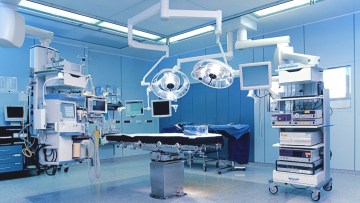Healthcare
Insects and rodents pose a real health risk to patients in hospitals and clinics. Healthcare providers need to adopt a zero-tolerance policy towards pests. BASF pest control solutions are used by trained professionals to ensure that patients are protected from pest infestations.
Usual issues

Hygiene
Effective pest control is essential in ensuring that the very highest standards of hygiene are being upheld in healthcare settings. Hospitals contain a range of different premises, each presenting their own hygiene and pest management challenges. Wards, operating rooms, pharmacies, waiting areas for the public, rest rooms and accommodation for staff, and even cafes and shops all need to be pest-free.
Reputation
A pest infestation can seriously harm a healthcare institution’s reputation. Cleanliness and sanitation is a key priority for hospital managers and poor pest control is seen as a sign of poor management.
Impact / risks
Patients exposed to contamination

Hospitals provide access to food, water, shelter, all of which are attractive to a range of common pests Disease carriers such as rodents, cockroaches, ants and flies can contaminate food but also medical supplies and equipment. Patients, whose immune system may be impaired, are exposed to the unacceptably high level of risk of contracting a disease spread by pests.
A team from Aston University analysed a sample of almost 20,000 flying insects collected over 18 months in seven UK hospitals. The study showed that nine out of ten of those tested carried bacteria such as E..coli, Salmonella and Staphylococcus aureus, half of them being resistant to antibiotics.
A drain on operational costs
There are many ways in which pests can access and damage healthcare facilities, thus exposing patients and staff to risk of infection. Cockroaches from the surrounding area may have found their way into the hospital café’s storage area and consumed and contaminated the food stuffs available there. Flying insects may infest waiting areas and staff rooms, if the premises are insufficiently proofed against these pests. Rodents can cause significant structural damage with their incessant gnawing and even cause fires when they strip electrical cables of their insulation.
Preventative measures are likely to be far less expensive than the costs involved in an actual infestation, which can send maintenance and cleaning bills rocketing.
Legal risk
Because hospitals comprise healthcare, catering and retail premises, they need to comply with the legal requirements in force for each of these different areas. More generally, they need to ensure the protection and safety of patients, healthcare workers and visitors. Facilities management teams in hospitals therefore must be able to satisfy inspectors from regulatory authorities that they meet the required standards, including pest control.
Benefits to use BASF products
Effective solutions, even in sensitive environments
A particular challenge for pest control in hospitals is the fact that not all insecticides or rodenticides are suitable for use in clinical settings. To ensure the safety of patients, pest controllers need to be certain that the products used to control vermin can be applied without risk of harm or cross-contamination to patients, staff and visitors. In order to meet the needs BASF offers a range of treatment solutions , to be administered by trained professionals, that are suitable for use in healthcare facilities.
Integrated pest management
Facilities managers are well aware of the serious threats associated with the presence of pests in a hospital or clinic. They rely on the expertise and experience of pest control operators specialised in treating healthcare sites to provide a range of services, including pest monitoring and surveillance, advice on pest proofing, and infestation control. BASF treatment solutions appropriate for clinical environments offers facilities management teams the reassurance that a pest infestation can be eradicated promptly and completely.


